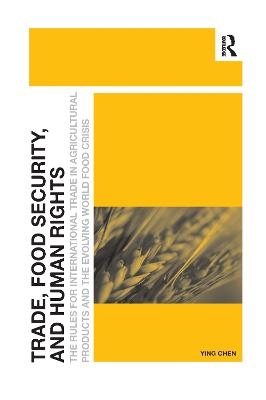
Trade, Food Security, and Human Rights
The Rules for International Trade in Agricultural Products and the Evolving World Food Crisis
Seiten
2020
Routledge (Verlag)
978-0-367-60037-2 (ISBN)
Routledge (Verlag)
978-0-367-60037-2 (ISBN)
The author argues here that there is no absolute food shortage and that distorted agricultural trade which undermines world food distribution is a vital and overlooked factor. The book looks at EU and US agricultural policies and World Trade Organization negotiations in agriculture and proposes that the international trade regime reconciles trade r
Most scholars attribute systemic causes of food insecurity to poverty, human overpopulation, lack of farmland, and expansion of biofuel programs. However, as Chen argues here, another significant factor has been overlooked. The current food insecurity is not absolute food shortage, since global food production still exceeds the need of the entire world population, but a problem of how to secure access to resources. Distorted agricultural trade undermines world food distribution, and uneven distribution impedes people’s access to food, particularly in poor developing countries. Examining EU and US agricultural policies and World Trade Organization negotiations in agriculture, the author argues how they affect the international agricultural trade, claiming that current food insecurity is the result of inequitable food distribution and trade practices. The international trade regime is advised to reconcile trade rules with the consideration of food security issues. Several other enforceable solutions to reduce world hunger and malnutrition are also advanced, including national capacity building, the improvement of governance, and strategic development of biofuel programs. This book will be of great interest to agricultural trade professionals and consultant policy makers in the EU, US and developing countries. Students and researchers with a concentration on international trade, agriculture economics, global governance and international law will benefit greatly from this study.
Most scholars attribute systemic causes of food insecurity to poverty, human overpopulation, lack of farmland, and expansion of biofuel programs. However, as Chen argues here, another significant factor has been overlooked. The current food insecurity is not absolute food shortage, since global food production still exceeds the need of the entire world population, but a problem of how to secure access to resources. Distorted agricultural trade undermines world food distribution, and uneven distribution impedes people’s access to food, particularly in poor developing countries. Examining EU and US agricultural policies and World Trade Organization negotiations in agriculture, the author argues how they affect the international agricultural trade, claiming that current food insecurity is the result of inequitable food distribution and trade practices. The international trade regime is advised to reconcile trade rules with the consideration of food security issues. Several other enforceable solutions to reduce world hunger and malnutrition are also advanced, including national capacity building, the improvement of governance, and strategic development of biofuel programs. This book will be of great interest to agricultural trade professionals and consultant policy makers in the EU, US and developing countries. Students and researchers with a concentration on international trade, agriculture economics, global governance and international law will benefit greatly from this study.
Dr. Ying Chen holds a Doctor of Juridical Science (S.J.D.) degree and a Master of Laws (LL.M.) degree from Indiana University Robert H. McKinney School of Law, United States and a Bachelor of Laws (LL.B.) degree from Yantai University School of Law, China. Her research interests are primarily in the areas of Food Law and Agricultural Law, International Trade Law, WTO Law, Public International Law, Human Rights Law, Global Governance, Chinese Law and Politics, and Comparative Law. Dr. Chen has published in major US and European law journals.
Trade, Food Security, and Human Rights
| Erscheinungsdatum | 01.07.2020 |
|---|---|
| Verlagsort | London |
| Sprache | englisch |
| Maße | 156 x 234 mm |
| Gewicht | 408 g |
| Themenwelt | Recht / Steuern ► Allgemeines / Lexika |
| Recht / Steuern ► EU / Internationales Recht | |
| Recht / Steuern ► Öffentliches Recht ► Umweltrecht | |
| Recht / Steuern ► Öffentliches Recht ► Völkerrecht | |
| Sozialwissenschaften ► Politik / Verwaltung | |
| Technik ► Umwelttechnik / Biotechnologie | |
| Wirtschaft ► Volkswirtschaftslehre ► Makroökonomie | |
| ISBN-10 | 0-367-60037-4 / 0367600374 |
| ISBN-13 | 978-0-367-60037-2 / 9780367600372 |
| Zustand | Neuware |
| Haben Sie eine Frage zum Produkt? |
Mehr entdecken
aus dem Bereich
aus dem Bereich
wichtige Gesetze und Verordnungen zum Schutz von Umwelt und Klima
Buch | Softcover (2024)
dtv Verlagsgesellschaft
CHF 30,65
mit Verordnungen, Verpackungsgesetz, Elektro- und …
Buch | Softcover (2024)
dtv Verlagsgesellschaft
CHF 27,85


